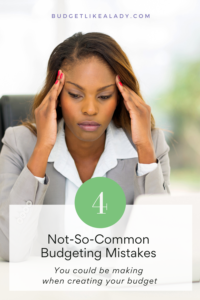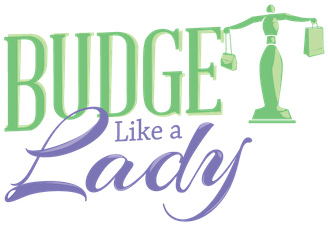Are You Making Any of These 4 Mistakes When Creating Your Budget?

3 Money Lessons I Learned From My Mom
May 5, 2020
Should You Break the Rules? When It’s OK to Be a Financial Rebel
May 19, 2020Another month goes by and you completely blew your budget. You can’t figure out where you are going wrong or how this keeps happening. You make good money, but you can’t seem to keep it in check. You are wondering if it is time to give up this whole budgeting thing?
Don’t give up yet. I have some ideas of what may have gone wrong…
Let me start by saying that there is a chance that it’s not you, it’s your budget. You’re going about creating a budget the wrong way. Let’s re-define the word “budget”.

What is a budget?
You may have heard a budget being called a spending plan, and that’s true. A budget helps you plan how much money you can spend compared to how much money you make. You can make a daily, weekly, monthly, or yearly budget, whichever fits best with your income and financial goals.
A budget is not a money diet. I don’t know about you, but I never participated in a diet that I didn’t break. I try to choose healthier food habits and dealing with money isn’t any different. Healthy money habits are what a budget is all about.
Just like with any other habit, start small, stay consistent, and reward yourself for your success! You can do this! Here are some common budgeting mistakes that can mess up ANY budget…
Are You Making These 4 Budgeting Mistakes?
#1. You never adjust your budget
A budget, or spending plan, can be changed at any time. Some months you don’t spend as much as you thought and other months you spend way too much. This is when you make adjustments in your budget to show the changes. For example, if you have unexpected car maintenance, maybe you can cover the cost with your dining out budget since you know that you won’t be dining out much this month anyways.
No month is exactly alike so your spending plan doesn’t have to be the same month after month. Making these changes and documenting them either on paper, spreadsheet, or software, will help you know which months to expect higher and lower expenses.
#2. You leave out of your budget what makes you, YOU!
Often, I coach clients who need to cut expenses and the first expense they cut is their favorite hobby or “me time” activity. This leaves to feeling stressed and not like yourself and you want to give up on budgeting if it makes you feel miserable. I don’t blame you, I know I have done that in the beginning.
Make a budget category for you! With this special budget category, it gives you the financial freedom you need to enjoy your indulgences without breaking the bank. You will feel happier and more complete. Don’t sacrifice the things that are important to you. Budget for your priorities.
#3. Not having “Oh Sh*t” Category
Forgive my language but in a perfect world, every month would go as planned. There will be no surprise bills, your kid doesn’t need any extra supplies for school, and your home won’t need any unplanned maintenance. Things would just be awesome and stress-free!
Unfortunately, life happens. We all need an “Oh Sh*t” category for the things we don’t expect. Having this extra category will keep your budget running smoothly and won’t leave you emptying your account if something unexpected comes up.
I recommend putting at least $10 to $50 per month in this category and only touching this for unexpected expenses. The Oh Sh*t category is different from your emergency fund. Emergency Funds are for job loss, high medical bills, or any reason you may lose income. The Oh Sh*t category is for lesser important items such as book fair money for your kids, last-minute girls night out, or the forgotten birthday gift.
#4. Making your budget too complicated
You don’t need 1,000 budget categories to make a budget work. The only things you need to know about your budget is how much you make, how much you spend, and how much you can save…that’s it! Budget categories are great if you can follow them if not, no worries! Just don’t spend more than you make.
Sit down with your most recent bank statements and income-earning statements and see how much you have left after spending to save for your Emergency Fund, Investing, or your new Oh Sh*t category. A traditional budget with 50 categories can be overwhelming. Keep it simple. The simpler the budget, the easier to keep track of it.
In Conclusion
A budget doesn’t have to be a scary thing. Knowing where your money is going can help you prepare for your future and build wealth. As you create your plan can keep your budget simple, plan to spend money on special indulgences, and prepare for the unexpected/forgotten you can keep up with your spending plan every month.

